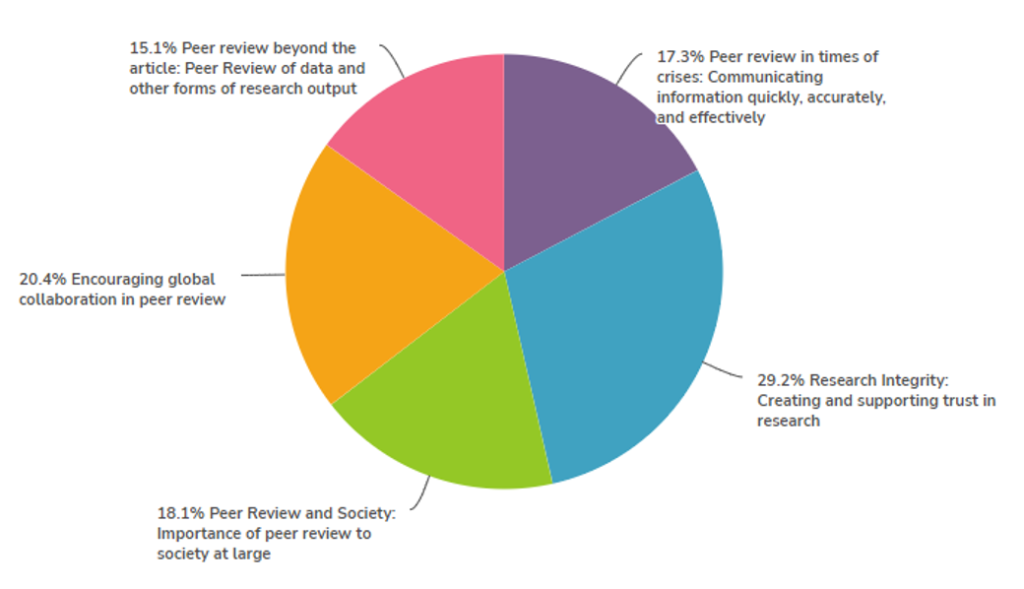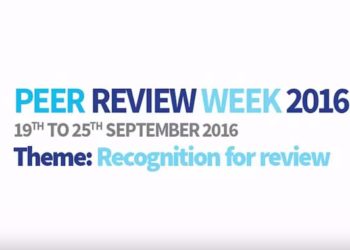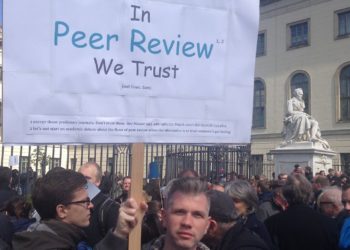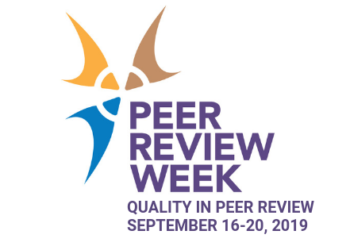Peer Review Week (PRW, September 19-23, 2022) is now in its eighth year, and it’s time to announce the theme for 2022! As usual, we’ll be celebrating with a week of posts here in The Scholarly Kitchen, which this year will be brought to you by all four of us. In the meantime, we’re grateful to this year’s Co-Chairs, Danielle Padula (Head of Marketing and Community Development at Scholastica) and Jayashree Rajagopalan (Senior Manager of Global Community Engagement at CACTUS) for sharing this year’s theme with us, and answering our questions about their plans for Peer Review Week 2022.

*Results of open global Peer Review Week theme poll
First things first, what is this year’s theme and how was it chosen?
Danielle: We’re very excited to announce that the theme for Peer Review Week 2022 is Research Integrity: Creating and supporting trust in research. During the week of September 19-23, participating organizations will host events and share resources to highlight how peer review contributes to and reinforces trust in scholarship, and discuss ways to improve current peer review practices within and across disciplines.
We selected this year’s theme by first working with the Peer Review Week steering committee to nominate five possible topics based on suggestions from our diverse group of members. Then we ran a community poll (open from May 19 – June 10, 2022), to invite editors, publishers, researchers, members of academic associations, librarians, funders, and other interested stakeholders to vote on their favorite theme option. This is the second time members of the scholarly community voted on the Peer Review Week theme. Last year we piloted a community poll and got over 380 responses, so we decided to try it again. The 2022 poll got over 1,200 responses — a marked increase and, I think, a clear indicator of the community’s interest in being part of the PRW planning process. Our goal is to make PRW as collaborative as possible, and the community theme poll is one way we’re working to do that.
How would you define research integrity as it relates to peer review?
Danielle: I would define research integrity as conducting research in a transparent, rigorous, and ethical manner that can be verified to the full extent possible, enabling others to have confidence in the methods and findings. Peer review standards are foundational to that and to creating a form of accountability.
So research integrity as it relates to peer review is all about presenting and adhering to standardized quality controls, albeit imperfect ones. Checking for potential conflicts of interest among researchers and those vetting their work, reviewing research methods to ensure adherence to disciplinary standards and ethical guidelines, handling allegations of misconduct should they arise, and retracting work when necessary, are all part of peer review.
How does peer review support research integrity and trust in research?
Danielle: At the highest level, peer review supports research integrity and trust in scholarship by introducing and ensuring adherence to the quality controls I covered in the question above. We can promote trust in research by making peer review policies and processes (e.g., ethical guidelines, type of peer review, revise and resubmit workflows) transparent for all parties involved, including the users of the work.
Without transparent assessment processes either before, during, or post-publication (or a combination of approaches), it’s certainly a lot harder to determine how trustworthy research is, particularly for a non-expert. However, I think a common misconception the scholarly community needs to work to dispel is that peer review is supposed to result in an iron-clad seal of approval that guarantees a piece of research is100% correct. In reality, peer review in all its forms (whether single or double anonymized or some flavor of open) is the formal start of healthy and essential deliberation about a piece of scholarship, not the end point.
Research is a living process, and disciplines are constantly evolving. So peer review is the start of a conversation that needs to continue within the research literature as scholars cite, comment on, and build upon each other’s work. And the initial findings could and likely should evolve and, ideally, be expanded upon over time.
I think helping not only early-career scholars but also members of the general public to understand how peer review works, how it’s standardized, and the extent to which it cannot be guaranteed is critical to building trust in research. Especially when we’re talking about global issues like climate change, people need to understand that peer review is just the beginning of the research process.
What are some areas of opportunity you see for improving trust in peer review?
Jayashree: This is such an exciting question! There are several opportunities and touchpoints for improving trust in peer review. What is exciting is that the scholarly publishing community is already discussing these at various forums and in various ways. Peer Review Week 2022 will nudge us to revisit those discussions and think about how we could streamline some of these efforts.
The biggest and most important area of opportunity, in my opinion, is addressing the gap between authors, reviewers, and editors where, to a great extent, a divide still exists. We need to discuss and drive home the fact that everyone is on the same team. Each of these stakeholders wants the same thing – the dissemination of credible information that is based on adherence to solid processes and standardized ethical practices. So providing more avenues or platforms where the perspectives and opinions of authors, editors, and reviewers can be shared more openly would be of great help. Each of these parties has its own set of expectations that are based on trust . Authors trust that editors will source the right reviewers for their papers and that reviewers will provide unbiased and constructive criticism; editors trust that reviewers will disclose any conflicts of interest and perform a fair and full review; and reviewers trust that authors have followed ethical practices and based their work on a robust research process. This trio of stakeholders is, therefore, closely linked by an underlying assumption of trust. Bridging gaps of understanding between them will help facilitate everyone’s collective trust in peer review, including the reader who trusts that the information being shared is credible and vetted thoroughly.
At a macro level, another area of opportunity involves revisiting our approach towards peer review. Transparency of peer review practices and openly sharing detailed peer review policies will help foster greater trust in the process, as will a shared understanding of peer review-related nomenclature (like the Standard Peer Review Taxonomy being developed by NISO). And since almost every research work is based on a previous body of knowledge that has preceded it, sharing peer review reports could also help improve trust.
Underlying all of this is the need to acknowledge that peer review is not perfect; that it involves a subjective human element; that it has to adapt to changing demands (like those imposed by the global climate change crisis or the COVID-19 pandemic); and, finally, that despite these challenges, peer review is still regarded by all stakeholders as one of the most critical ingredients of a robust process of discovery and dissemination.
What do you have planned for Peer Review Week 2022?
Jayashree: As Danielle mentioned, we kicked off Peer Review 2022 with an open global survey to ensure that the theme for this year’s event would be chosen by the community. Now that the theme has been determined, we are planning a series of announcements on the Peer Review Week website and our Twitter account. We will also make sure the announcement and information about the theme for this year’s event is made available in multiple languages so that Peer Review Week 2022 gets maximum visibility and outreach around the world. We invite the community to spread the word about Peer Review Week using these announcements.
In the weeks leading up to the event, we will put out regular calls to the community to participate and share the activities or events they are organizing during the week – this will help broadcast events that are being planned on a global scale. During Peer Review Week itself, we will facilitate discussions or Ask Me Anything sessions with Steering Committee members and others working on peer review in scholarly communications, such as institutions, funders, and librarians, as well as publishers. We will also actively share and initiate discussions around the role of peer review in upholding research integrity on Twitter. Additionally, we will invite short videos from the global community. These videos will be hosted on the Peer Review Week YouTube channel, where you can already find a great selection of short videos from previous years.
Most importantly, we plan to engage in specific outreach efforts for stakeholders from different geographies to help ensure no one misses out on an engaging or important discussion and that Peer Review Week equally captures the voices of authors, reviewers, and editors from each part of the globe.
Who do you hope will get involved this year — and how?
Jayashree: Every year, authors, journal editors, and reviewers get involved in Peer Review Week. This year’s topic of “Research Integrity: Creating and supporting trust in research” is a theme that resonates with every stakeholder involved in the process of research and its dissemination. Given this, we are looking forward to funders and librarians also joining the discussions around how peer review influences the integrity of research. We also hope to attract stakeholders from different regions to add their own perspectives, experiences, and expectations. These voices will add a newer, more diverse, and richer dimension to conversations around how we can improve trust in peer review.
Where can we find out more about joining in this year’s Peer Review Week?
Danielle and Jasyashree: To learn more about how you can support and participate in Peer Review Week 2022, visit the “Get Involved!” page on our official website! If you’re interested in joining the PRW steering committee (we’re always looking for volunteers!) or if you have any questions about submitting a PRW activity, please email us at contactprweek@gmail.com. We’re looking forward to an exciting week of informative and actionable discussions about ways to promote research integrity and trust in peer review.
Many thanks to The Scholarly Kitchen for the opportunity to do this interview and for contributing to PRW discussions every year!
Discussion
4 Thoughts on "Announcing Peer Review Week 2022: An Interview with the Co-Chairs"
Some excellent talks and topics here too in the preliminary program – https://peerreviewcongress.org/peer-review-congress-2022-program/ Is it Peer Review Month, or Week? The International Congress on Peer Review and Scientific Publications is 8-10th September
Thanks Adrian – maybe it should be Peer Review Fortnight at least! It will be a tight turnaround but we are hoping to include a summary of research integrity focused sessions from the Congress in our Peer Review Week posts 🙂
Scholar 1 and Editorial Manager are very old fashioned systems, being left behind by Frontiers, MDPI and systems Springer are developing. There really needs to be less focus on them.
They’re a lot of the reason electronic publishing hasn’t really developed much over the last 20 years.
And to be honest Aries Systems/Editorial Manager is a basket case of a company. The only reason they’re still in business is Elsevier keeping them afloat, for purely competitive reasons – they like having control over a system a lot of their rivals rely on
Submission and peer review systems, particularly systems that scale, are notoriously difficult to build. I wrote about this back in 2017:
https://scholarlykitchen.sspnet.org/2017/12/20/end-aperta-journal-submission-systems-remain-challenging/
MDPI is an interesting case though — they have largely resolved many of the problems and sped up the publishing process not by building a better submission/peer review system, but instead by throwing enormous numbers of staff at the problem — this is described here:
https://scholarlykitchen.sspnet.org/2020/08/10/guest-post-mdpis-remarkable-growth/



